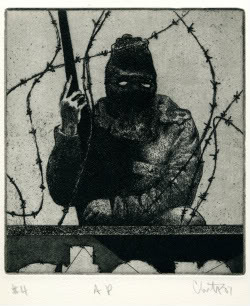What do you think?
Rate this book


351 pages, Mass Market Paperback
First published October 1, 1997


All ten people in Julian Class’s platoon had the same basic weapon-- the soldierboy, or Remote Infantry Combat Unit: a huge suit of armor with a ghost in it. For all the weight of its armor, more than half of the RICU’s mass was ammunition. It could fire accurate sniper rounds to the horizon, two ounces of depleted uranium, or at close range it could hose a stream of supersonic flechettes. It had high explosive and incendiary rockets with eyes , a fully automatic grenade launcher, and a high-powered laser. Special units could be fitted with chemical, biological or nuclear weapons, but those were only used for reprisal in kind.FYI, the photo above is the frontispiece from my Easton Press copy of the novel so I thought it was the best representation of the RICU. However, before I found that I had already set aside the following pic and so I will go ahead and share rather than waste it because I thought it was pretty cool.


a surface as, in mathematics, three points define a surface. It’s a philisophical surface that everyone of our age has been concerned with all our intellectual lives: the problems of war and pacifism...Why has any of this happened?.There are important matters being examined here and SF fans interested in these issues should check this out. There is much to make your brain swoon.

